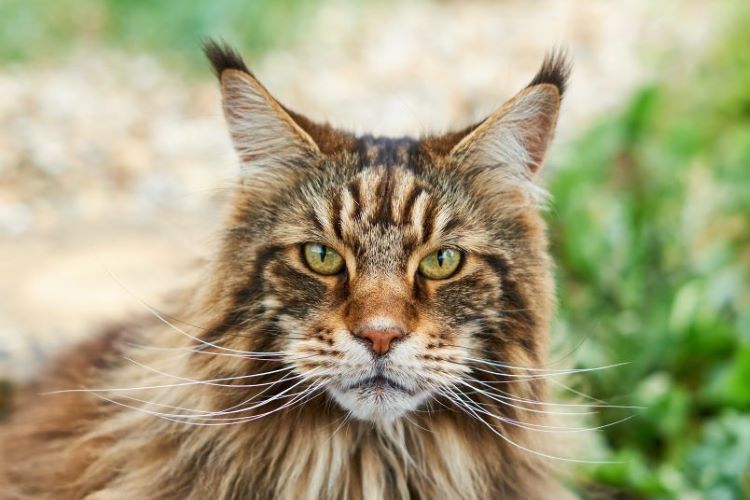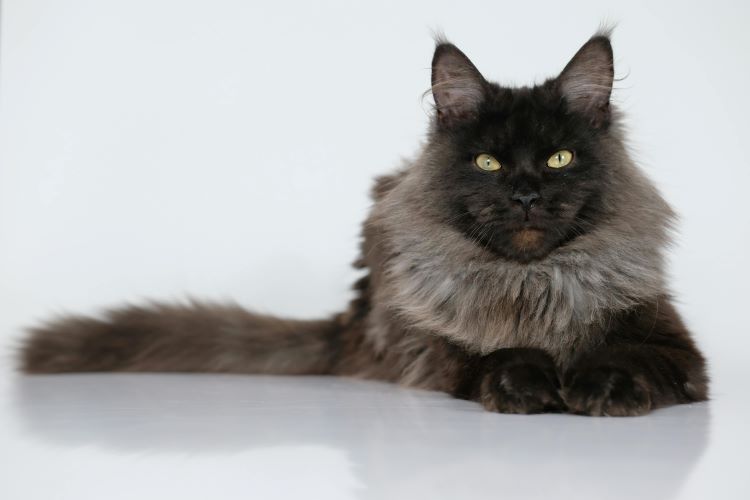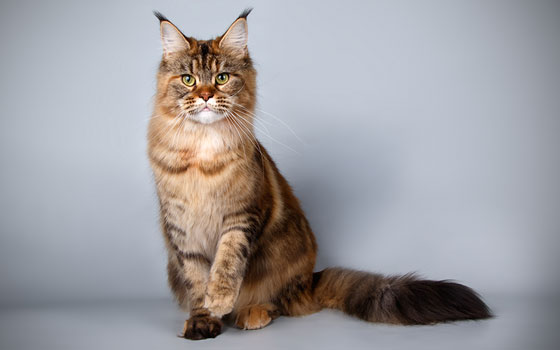Ready to help treat your pet to a healthy life?
Maine Coon Cat Breed Guide: History, Fun Facts & Health
By : Trupanion Staff | Updated Apr 8, 2024

It's practically impossible to think about big domestic cats without going straight to the Maine Coon. These beautiful kitties are renowned across the world for their majestic appearance complete with ear tufts, bushy tails, and stoic gazes — and yes, they're quite large compared to most other types of pet cats!
Of course, appearance isn't everything. There's a lot more to love about Maine Coons beyond their looks. Whether you're considering adopting a Maine Coon, looking to learn more about your cat, or just generally interested in feline facts, here's a breed guide to help.
Maine Coon fun facts
- The Maine Coon cat is the official state cat of Maine, native to the state and surrounding area.
- They were reported to have gone extinct in the 1950s, but this was a bit exaggerated. Numbers were extremely low, but thanks to the dedication of breeders, the Maine Coon Cat has rebounded to become one of the top three most popular cat breeds in the United States.
- This breed is prone to polydactylism, meaning they are born with 6 or more toes — an estimated 40% of early Maine Coons had an extra toe.
- Maine Coons have a water-resistant coat and generally enjoy the water more than other cats.
- They are big cats and the largest domestic breed. Full-grown Maine Coons reach between 19 and 30 lbs. (8.6 to 13.6 kg), and they can grow to be over three feet long!
- The Guinness World Record for the longest tail ever recorded on a domestic cat was awarded in 2016 to a Maine Coon named Cygnus, whose tail measured in at 17.58 inches (44.66 cm) long. For comparison, the average tail length for a domesticated cat is 12 inches (30.48 cm).
- The breed has an average lifespan between 9 and 15 years. However, Rubble, the oldest Maine Coon ever on record, was also believed to be the oldest living cat when he passed away in 2020 at the ripe age of 31.
- Despite their size, Maine Coons are known for being cuddly, docile, and lovers of lazy time. They are often considered to be gentle giants.
Recognizing a Maine Coon
Most people have an idea of what a Maine Coon looks like even if they've never met one, but recognizing one can still be a bit tricky. After all, these cats can closely resemble some other feline breeds, and their size alone is not their only defining characteristic. It's also worth noting that Maine Coons come in a wide range of coat colors and patterns, to the point that they have more visual diversity than even a lot of cat enthusiasts may realize.
So, what exactly is a Maine Coon? We'll start with the breed's trademark features:
- A tail with thick, flowing fur, wide at the base and tapering
- Broad chest and rectangular body shape
- Long, shaggy coat
- Lion-like mane or ruff around the neck and chest
- Pointed ears with tufts of fur at the tips
- Wide, round feet with fur tufts growing out between toes
In addition to these physical notes, the Cat Fanciers Association sets the Maine Coon breed standard as having a "visibly square" muzzle/chin area, high cheekbones, and a "well proportioned and balanced appearance with no part of the cat being exaggerated."
Colors and patterns
The Maine Coon is seen in many different colors and patterns, but the most common are the brown classic and the mackerel tabby. That said, this cat can come in everything from all white to dark gray and just about everything in between. Eye color can likewise include shades of green, green-gold, yellow, or copper.

Personality
Affectionate but not needy, a Maine Coon shows curiosity in what you’re doing but is also talented at entertaining themselves. With low to medium energy, this breed is content to cuddle up next to their people or practice their mousing skills with toys.
Maine Coon cats are considered relaxed and easy-going pets overall, which makes them a great choice for families with other kittens, adult cats, dogs, or children. They are known as the gentle giants of the feline world. While they’re only moderately active at best, they are very athletic and maintain a kitten-like enthusiasm for play and antics well into their older years.
Similar cat breeds to a Maine Coon
- Norwegian Forest Cat
- Siberian
- Turkish Angora
History of the Maine Coon
The origin of the Maine Coon is steeped in some mystery, as there was no official breeding program that created the breed. In the late 1800s, some said the cats were a result of mating between raccoons and domestic cats, which is physically impossible. But their tail does resemble that of a raccoon, hence the inclusion of “Coon” in the breed name.
Another prevalent story is that Marie Antoinette sent the predecessors of the breed to Maine in anticipation of her escape to America. There’s even mention of the Vikings having brought over these long-haired cats, and the Maine Coon does resemble the Norwegian Forest Cat.
The answer lies in the natural mating between the short-haired domestic cats that originally came to America with the first settlers from Europe and the longhaired cats imported by seafaring merchants. The climate of the Northeastern United States favored the longer double-coats for warmth, and the need to walk over snow made the large snowshoe-like paws incredibly useful.
The first registered Maine Coon was in 1861 with a black and white male cat named ‘Captain Jenks of the Horse Marines’. The breed was a popular show cat during the late 1800s, with a brown tabby female Maine Coon named ‘Cosey’ winning Best in Show and the Silver Collar at the first North American Cat Show held at Madison Square Garden, New York in 1895.
The breed’s popularity declined in the early 20th century due to the rise of more exotic breeds such as the Persian. In the 1950s it was believed the breed was extinct, as none had been registered in cat shows since 1911.
However, committed cat breeders and fanciers of the breed founded the Central Maine Cat Club to keep the breed around, and in 1973 the Maine Coon Cat Club was formed, which led to the Cat Fanciers’ Association granting championship recognition to the breed in 1976.
The Maine Coon is now the third most popular cat breed based on kitten registrations with the CFA and is a common sight in show rings.
Do Maine Coons make good pets?
As mentioned earlier, Maine Coons are often known as the gentle giants of the cat world and often make great pets for families. They have a very easy-going nature and are quite patient with even young children. They are often devoted and loyal to their humans and prefer to be where the family is, but they don’t constantly demand attention. For many pet owners, it's the best of both worlds as these kitties can be both independent and sociable without extremes.
While slow introductions are needed, Maine Coons are generally tolerant with other pets (including dogs). They tend to have a kittenish attitude and do enjoy playing, exploring, and simply snuggling with their people.
Exercise needs
Like all cats, Maine Coons require regular exercise to maintain their health and help prevent obesity. The Maine Coon is not the most active breed on its own, but they can be quite athletic when the occasion calls for it. You can encourage your pet to burn energy by engaging them with toys (wand toys work great for these cats) and ensuring they have plenty of perches they can climb and jump to.
Diet, exercise and regular vet visits are particularly important for Maine Coons because this breed is at higher risk of Hypertrophic Cardiomyopathy (HCM), a serious heart condition that cats can often hide or compensate for well.
Mental enrichment
Today’s Maine Coons came from cats who spent most of their time outdoors, many of whom were given jobs as mousers in barns and out-buildings. As a result, Maine Coons are particularly fond of chasing ground-prey, so providing them with toys that resemble mice, rats, snakes, lizards, and beetles may be particularly engaging.
Maine Coons also seem to be entranced by water and enjoy playing with faucets or dunking their paws in bathwater.
Because Maine Coons are highly intelligent, they can be trained to perform tricks and walk on a harness/leash. Even though Maine Coon kittens and cats are relaxed and easy-going, they still need daily opportunities to experience novel activities and new objects.
Activities for Maine Coons
- Exercise using a wand toy with lures resembling ground prey may be preferred; look for lures that mimic mice, rats, snakes or lizards, or even bugs.
- Clicker-train Maine Coons to play fetch, perform tricks (e.g., sit, fist-bump, roll over, etc.), or even follow their guardians through an agility/obstacle course.
- Teach your Maine Coon to go for walks on a harness and leash! This breed loves spending time outdoors exploring various environments.
- Maine Coons are fascinated with water. Let them play with a running faucet, or small toys or ice cubes in a bucket/tub of water. Some Maine Coons are known to dunk their food in water!
- Food puzzles can give this breed a mental challenge. Make sure to give them food puzzles that can be manipulated by their somewhat larger paws; even food puzzles made for dogs might work well for Maine Coons.
- While Maine Coons like snuggling up next to their people on the couch, they will surely also appreciate a place of their own. Try a window bed so that they can watch birds and squirrels outside.
Maine Coon health concerns
Maine Coon cats are generally healthy and robust, but like all breeds, they can be prone to certain health issues. If you have a Maine Coon or are hoping to adopt one soon, it's important to be aware of these potential health concerns and keep up with routine veterinary appointments. You'll also want to look into cat insurance to help with any unexpected health costs.
The good news is that many Maine Coons go on to live full, healthy lives, and there are no guarantees your pet will get sick. Nevertheless, some common health concerns in Maine Coon cats to be aware of include:
- Hip Dysplasia — Due to their large size, these cats can be more likely to develop hip dysplasia, a condition where the hip joint doesn't fit together correctly. Over time, this condition can lead to discomfort and lameness.
- Hypertrophic Cardiomyopathy (HCM) — HCM is the most common heart disease seen in cats, including Maine Coons. It is a condition where the heart muscle thickens, leading to potential heart failure.
- Spinal Muscular Atrophy (SMA) — SMA is a genetic disorder that affects the spinal cord's motor neurons, leading to muscle weakness and atrophy. Maine Coon cats can carry the gene for SMA, although not all affected cats show symptoms.
- Polycystic Kidney Disease (PKD) — PKD is a hereditary condition where fluid-filled cysts develop in the kidneys, affecting their function over time. It can lead to kidney failure in severe cases.
- Obesity — Thanks to their large size, hearty appetites, and penchant for long hours laying around, Maine Coon cats may be prone to obesity. However, this can be curbed with a balanced diet and regular exercise. Left unchecked, obesity can lead to various health problems, including diabetes and joint issues.
- Urinary Tract Issues — Maine Coon cats may be predisposed to urinary tract issues such as bladder stones or urinary tract infections. Providing plenty of fresh water and a balanced diet can help prevent these problems.
- Gastrointestinal Issues — Some Maine Coon cats may be prone to gastrointestinal issues such as inflammatory bowel disease (IBD) or food sensitivities. Maintaining a consistent diet and monitoring for signs of digestive upset is important.
Remember; regular veterinary check-ups and screenings can help catch and manage potential health issues early on, leading to better outcomes. Additionally, responsible breeding practices can help improve the overall health of the Maine Coon breed.
Grooming and hygiene tips
Maine Coons have a medium to long double-coat with a lightweight undercoat and overall silky texture. This coat is designed to insulate against the cold weather and be water-resistant. Surprisingly, it is also less prone to matting than other long-haired feline breeds. However, it does require regular brushing to clear out debris and help distribute natural oils throughout the fur.
As with all cats, Maine Coons also benefit from regular nail trimming and teeth brushing. If your Maine Coon is polydactyl, nail trims are especially necessary to prevent ingrown toenails.

Maine Coons in pop culture
Thanks to their memorable appearances, Maine Coons are popular internet kitties and have graced the big screen multiple times. They're also no strangers to being the pets of celebrities.
Famous Owners of the Maine Coon
- Nathan Fillion (Actor)
- Bobby Flay (Chef)
- Joe Perry (Musician)
- John Cleese (Actor)
Famous Maine Coons
- The gorgeous specimens documented by photographer Robert Sijka. If you are a Maine Coon enthusiast, his Instagram account is a must-follow.
- A Maine Coon named Barivel currently holds the Guinness World Record for the longest cat alive — measuring in at 3 feet 11.2 inches long. He lives in Italy with his humans, who chose his name because it means "jolly" or "clown" in their local dialect.
Maine Coons in media
- Mr. Filch’s cat, Mrs. Norris, in the Harry Potter films
- Church the cat in the 2019 remake of Pet Sematary
